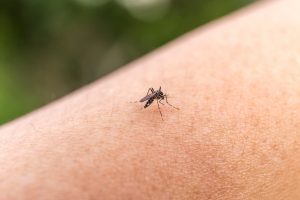The Zika virus is spread through mosquito bites and insecticides can help reduce your risk of getting bitten. The Zika virus originated in Brazil and is quickly becoming a global problem with many countries now being labeled as dangerous for travel, especially for pregnant women.
The Zika virus poses a more serious risk in pregnant women, as it contributes to birth defects of the child, and so if you are expecting or planning to have a child, it’s important to avoid the countries with cases of Zika.
There is currently no vaccine for Zika virus, nor a cure, but researchers are already beginning to discuss the topic in hopes to develop one quickly.
Below is a compilation of Bel Marra Health’s top stories regarding the Zika virus to educate you on what you need to know in order to keep yourself safe.
Experts predict Zika virus will travel to the Southern U.S.

Experts predict that Zika – a mosquito-borne virus – will travel to the Southern U.S. Although experts are not sure when the virus may spread, they are certain that it is only a matter of time that the birth-defect illness will make its way into America.
The Centers for Disease Control and Prevention (CDC) have already introduced travel warnings to the countries affected by the Zika virus, especially for pregnant women who are at highest risk.
Reports of birth defects in Brazil due to the Zika virus have already accounted for 3,900 babies born with defects. Worse yet, doctors are still unsure how exactly the virus affects unborn babies but only know that it can lead to serious birth defects including microcephaly. Continue reading…
Zika virus travel precautions supported by American Ob-Gyn group
The U.S. Ob-Gyn group supports the Zika virus travel precautions set out to protect pregnant women from traveling to countries stricken by the Zika virus. Pregnant women are at high risk of contracting the Zika virus, which can lead to birth defects. Countries affected include Central and South America and the Caribbean.
In Brazil last year thousands of babies were born with microcephaly, a brain disorder linked to the Zika virus. Babies born with this condition have abnormally small heads, which can lead to developmental issues, even early death.
The American College of Obstetricians and Gynecologists (ACOG) urges pregnant women to steer clear of countries with the Zika virus based on the warnings presented by the Centers for Disease Control and Prevention (CDC). Continue reading…
Zika virus could spread to America, threat in Brazil
The virus which is native to certain areas in Asia and Africa has been recently spreading locally in the Americas, especially South America. The virus is probably linked to the recent spate of serious birth defects in Brazil. In fact, there has been a 20-fold increase in the number of babies born with a condition, known as micro-cephaly, since Zika first appeared in Brazil in May 2015.
As there is no is no vaccine to prevent the virus, or treatment to fight the virus, the need of the hour is to take adequate measures to reduce the spread of the virus. Continue reading…
Scientists find genetic clue to mosquito’s resistance to insecticides
The work allowed researchers to start a consortium involving more than 40 countries and ten institutions, with the goal to compile the first global map of mosquito resistance mechanisms to insecticides. This key initiative is supported by the World Health Organization.
Preventing the spread of mosquito-borne diseases is a global health challenge as the pests’ ability to resist insecticides helps the spread of diseases such as the West Nile Virus infection, malaria, dengue fever and Chikungunya. (The latter causes severe fever and joint pain.) Some of these diseases can easily scale up to full-blown epidemics. Continue reading…
Factors that increase your risk of mosquito bites
Blood type: The only thing worse than being bit by mosquitoes is being the only one getting bit. Initially, you can blame your blood type for that. Although researchers are unclear of the exact reason why one blood type is more favorable than another, they have noted that type-O seems to be the blood of choice.
Skin type: Another factor to keep in mind is each person’s skin. Because each person’s skin is different, even if two people are bitten the same number of times, they may get different reactions. For example one person might be itchier and another may be redder. And another might only get the tell-tale bump with no symptoms at all.
Diet: You may have also heard that your diet can make you more susceptible to bites. It’s been said that eating sweet things makes you more prone to the pests. Researchers haven’t found a diet-bite link, so your sweet tooth is in the clear for now.
Alcohol: Lastly, there was a small study published in the Journal of American Mosquito Control Association, which involved 13 people who drank beer. Researchers from the study note mosquitoes were prone to these individuals’ arms. It’s important to consider, though, the study was quite small so more research is needed to confirm this. Continue reading…